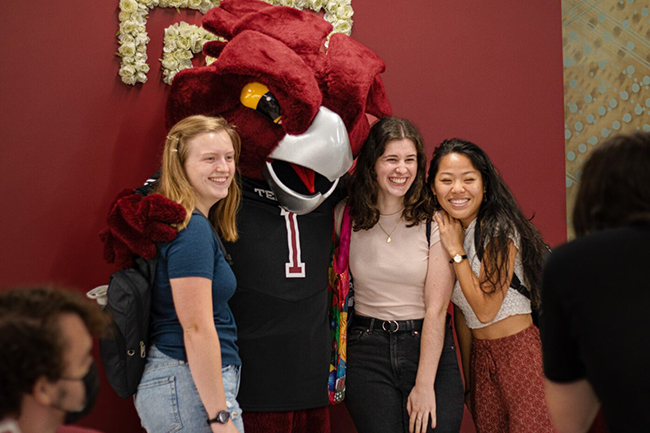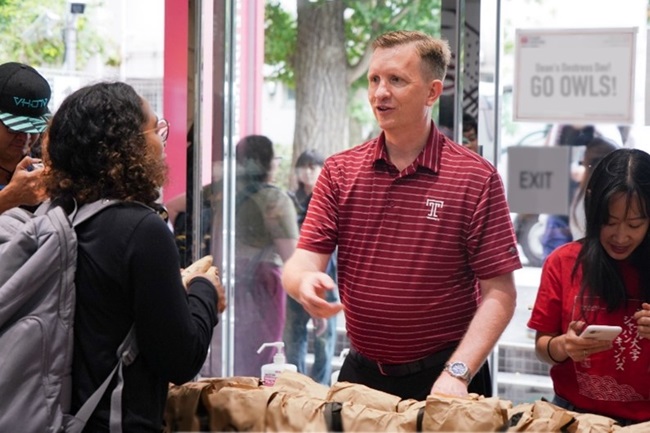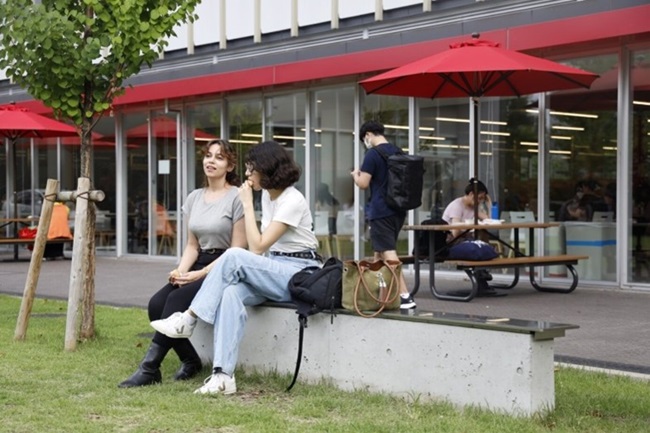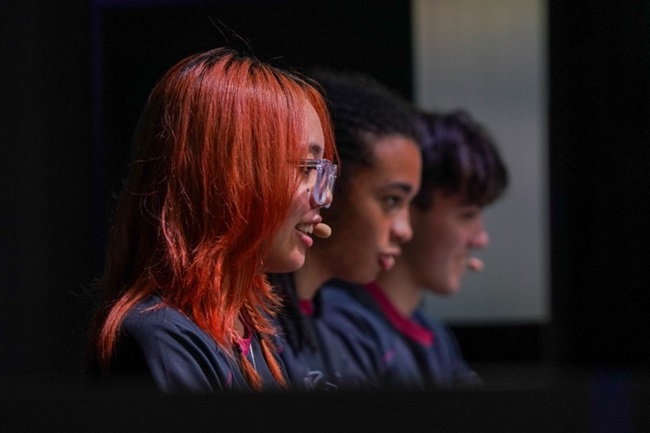Temple University Japan Campus (TUJ) is located in Setagaya, Tokyo. Last year, we celebrated the 40th anniversary of the opening of our Japanese school. As the Japanese branch of an American university, it has contributed to the internationalization of Japan. The number of students has increased even since the start of the coronavirus pandemic, and currently has approximately 2,200 students. We spoke to President Matthew Wilson about his efforts to maintain strong university operations at a time when universities in Japan are currently suffering from a decline in student numbers due to the declining birthrate.

Pioneer of foreign universities in Japan
In 2023, TUJ will enter its 41st year. TUJ opened in Tokyo in 1982 and attracted attention as a higher education institution where American university education was available in Japan. During the 1980s and 1990s, many foreign universities established campuses in Japan, but only two American universities still exist. When TUJ first opened, most of its foreign students studied abroad for short periods of time, mainly staying for six months. I studied law at Temple University School of Law and became an international lawyer. Partly because of this connection, I came to Japan as a professor at TUJ from 2003 to 2009, and at that time also served as senior vice president and legal advisor.
The situation changed in 2005 when TUJ was designated as a "Japanese campus of foreign universities" by the Ministry of Education, Culture, Sports, Science and Technology. As a university, we started issuing visas to students from overseas, and the number of students increased. Nowadays, it has become popular because it allows students to earn a degree from Temple University in Japan, and it has become a truly global campus where students from approximately 70 countries study. There was a period when the number of students declined due to the Great East Japan Earthquake in 2011, but in 2020, when I became president, there were about 1,250 students, and currently about 2,200 students are studying at TUJ.

TUJ President Matthew Wilson communicates with students at the annual “Dean’s Distress Day” hosted by the president.
Achieving a global American university education while staying in Japan
The American main campus of Temple University has a long history, having been founded in 1884, and is highly regarded as a state comprehensive university. It was ranked 2023th in the comprehensive university category of the 10 U.S. University Comprehensive Rankings published by U.S. News & World Report in October 2024, a significant increase from 89st place the previous year. The quality of our education at TUJ comes from the fact that our curriculum, class content, degrees and qualifications are all awarded by our main school in the United States. Therefore, I don't think there are many other places like this where you can obtain an official American university diploma while staying in Japan.
Currently, 74% of TUJ's undergraduate faculty members are foreigners, of whom 37% are American. Although it is based on American-style university education, a major feature is that the teachers flexibly incorporate the positive experiences they have gained in their respective countries and utilize them in their classes, giving it an increasingly global feel.
The quality of education at TUJ is the same as our American school in terms of curriculum, class content, and qualifications. However, the tuition fees are set to suit the Japanese environment, so they are cheaper than our main school in the United States. Therefore, it is a great benefit for both Japanese students and students coming to Japan from overseas.
Last year, we launched a new special program, the Fly to Philly Program. Under this program, TUJ students can study abroad at our main campus in the United States for up to one year, and the tuition fees at our Japanese school will be applied to them. By expanding study abroad opportunities for undergraduate students who wish to study at TUJ's Japanese and American campuses, the aim is to broaden students' horizons, encourage personal growth, and deepen cross-cultural exchange.
In addition, the campus is close to Shibuya, which is popular among foreigners, and Shimokitazawa, a subculture town, and this international environment, where students from about 70 countries gather, will be attractive to students. Is it? I believe that the fact that we are trying to provide our students with a variety of global experiences through this kind of environment and practical lessons has attracted attention and led to our high evaluation.

Various TUJ initiatives attracting attention from both students and companies
This year, TUJ introduced an eSports certificate program to its undergraduate program. When you think of e-sports, you may think that it is simply about training players who are good at games or creating the games themselves, but this program treats e-sports as an academic field and aims to help students succeed in an industry with great potential. Our main focus is on developing human resources. I have been involved in esports programs at the universities I have worked at in the United States, and I have learned that esports is used in a variety of fields, from business, management, broadcasting, media, art, and computer science to law, psychology, and even medicine. I don't think it is widely recognized that it can provide a wide range of career opportunities. At TUJ, we have created four courses in our undergraduate program to help students understand e-sports from a business and management perspective. The credits will also be recognized as necessary for graduation. In addition, TUJ's official e-sports team has been launched, and we are also forming corporate partnerships. The aim is also to provide opportunities for students to learn useful skills such as communication, teamwork, leadership and strategic thinking through esports both inside and outside of the classroom.
Furthermore, starting from the fall semester in September of this year, we have established a Department of Tourism and Hospitality Management as an undergraduate program. Currently in Japan, there is a noticeable shortage of human resources due to the increase in the number of tourists from overseas. Temple University's Department of Tourism and Hospitality is rated among the top in the world*. TUJ's Department of Tourism and Hospitality offers classes and curriculum from our main school in the United States, and requires two internships in order to graduate. This internship is very difficult and requires 9 hours of work experience at one company and 2 hours at a second company to earn credits. - Expectations from the hospitality industry are high, and we believe that students will have a wide range of career choices.
TUJ has many bilingual, trilingual, and multilingual students. Many students coming from overseas want to stay and work in Japan, and as the various initiatives mentioned above have come to the attention of companies, we have received many inquiries from various companies. became.
We are also focusing on programs to develop the next generation of leaders. Two years ago, we launched a special course called the "Emerging Leaders Program" with the goal of developing future student leaders. This program recruits new students and provides them with intensive and practical leadership training before the start of the semester, with the aim of helping them acquire skills that will enable them to thrive in a global environment in the future. One of our main activities is to plan and implement ``Spirit Week,'' a cultural event that is customary at schools and universities in the U.S. and aims to foster a sense of love for the school and foster unity among students. We foster a mindset of taking the initiative and nurturing future leaders.

An indispensable presence for Japan's globalization
TUJ emphasizes "experience" in practice. In class, we start by actually tackling small "problems." To find out how to solve the ``problem'', students go to the actual site, make observations, and then return to the classroom. There, students analyze and discuss what went well, what was lacking, and where improvements can be made, and through the experiences they gain, their perspectives broaden. Teachers strive to provide this kind of education every day. The same goes for internships. TUJ practices American-style internships. We will give you credit for the experience of working and learning as a trainee for an average period of about 3 months. Therefore, it is not enough to simply go to work and work; instead, we make sure that we thoroughly discuss what we have worked on, what we have learned, and what improvements we have made by returning to university and discussing them with our instructors, and then returning to our internship site. Masu. I believe that these numerous experiences create the foundation for TUJ students to be successful in the real world.
Furthermore, in order to deepen their understanding of the experience and impact of the Great East Japan Earthquake, the undergraduate students actually went to Fukushima, met with government officials, spoke with people who had experienced the tsunami and earthquake, and actually learned about nuclear power. We also visited the power plant. Accumulating a variety of experiences like this will definitely provide you with great support when you go out into the real world. I personally feel that going to the Supreme Court during my law school days and having the opportunity to actually talk to the judges was a valuable experience.
We received various offers from prefectures across the country, and in December 2022, we signed a comprehensive agreement with Yamanashi Prefecture. Many students from other universities in Japan come to TUJ to study English.
My dream is that when many people in Japan hear the word "global," they think of TUJ and TUJ students. We would like to continue our efforts and take on new challenges so that TUJ can become an indispensable part of Japan's globalization.
*Academic Ranking of World Universities (ARWU) is a ranking of universities around the world published by Shanghai Ranking Consultancy. It is also commonly known as the "Shanghai Ranking."

Temple University Japan Campus
President Matthew Wilson
In September 2020, he became president of Temple University Japan Campus (TUJ). Since then, he has strengthened his focus on student success (achieving goals) and developed innovative management strategies, raising the number of students enrolled in TUJ's undergraduate programs to record highs. He is also an alumnus of the same university's American law school and has studied abroad at TUJ.
At TUJ, he served as Law School Director (2003-2005) and Senior Vice President (2004-2009). In 2014, he served as professor and dean of the University of Akron School of Law (Ohio, USA), and in 2016 joined the same university. Became chief. He has served as president of Missouri Western State University (Missouri, USA) since 2019.

